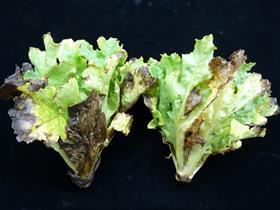
AHDB has launched a three-year research programme to boost understanding and improve control of downy mildew and late blight in horticultural crops and potatoes.
Building on current knowledge, the research will focus on developing methods to detect disease in seeds, tests to understand fungicide resistance, and tools for real-time disease risk monitoring.
The research, which began on 1 January this year, will support a range of crops including potatoes, lettuce, spinach, basil, onions, peas and tomatoes.
The extensive £294,000 project benefits from the specialist knowledge of five research contractors and will maximise the investment through close collaboration with related Innovate UK projects.
Downy mildews and late blights develop rapidly and have the potential to cause complete crop loss. Lettuce downy mildew (Bremia lactucae) is estimated to cause more than £15 million worth of crop loss per year.
Cathryn Lambourne, project lead at AHDB, said: “Control of these diseases currently relies heavily on fungicides but with increased withdrawals of key actives and the development of fungicide resistance, sustainable integrated management strategies are needed to ensure growers are equipped to cope in the short, medium and long term.
“A key element of the research will be providing growers with practical and useful knowledge, tools and guidance to help them develop effective control strategies.”
Tim Pettitt, the project manager based at the University of Worcester, added: “We have a consortium with diverse expertise across all horticultural sectors, ranging from the development of molecular tests to muddy boots field-pathology. We are excited to have this opportunity to tackle the problems caused by downy mildew and late blight in horticultural crops.
“Our goal is to help the industry develop and improve integrated management strategies. Knowledge gaps such as the dynamics and significance of seed-borne infection and the effects of supra-visual lighting regimes will be investigated.
“We will draw on experience in other sectors to develop innovative tools for the detection, monitoring and characterisation of these pathogens”.
The research consortium includes James Hutton Institute, University of Worcester, NIAB EMR, Stockbridge Technology Centre and RSK-ADAS.



